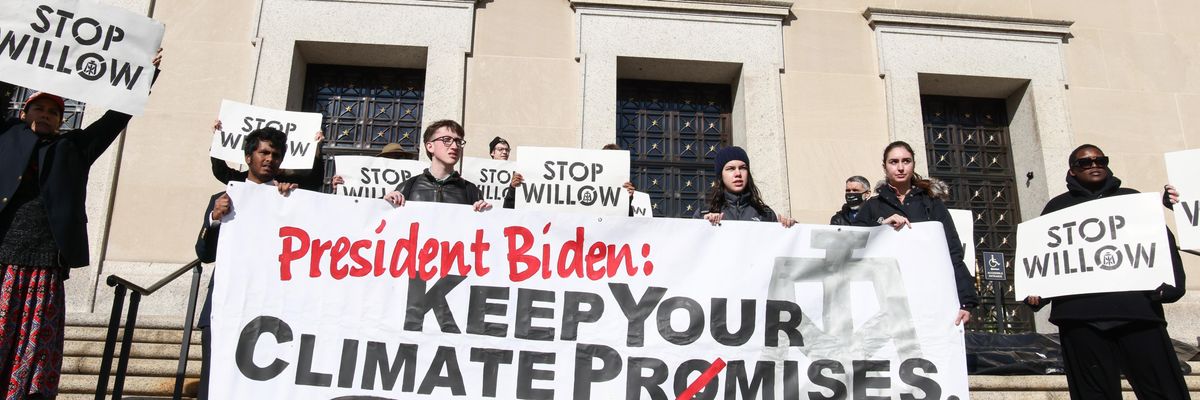The Biden administration is reportedly expected in the coming days to release an environmental analysis that will endorse partial approval of a massive oil drilling initiative on the North Slope of Alaska, alarming climate advocates who say the so-called Willow Project poses a dire threat to the environment, local communities, and wildlife.
The Washington Post reported Wednesday that the legally required environmental assessment, which is set for publication this week, "will trigger a final decision from the Interior Department in a years-long showdown between the federal government and ConocoPhillips about its legal right to drill one of the largest oil and gas developments on federal territory."
According to the Post, which cited unnamed sources briefed on the process, the report "is being drafted to lay out a preferred alternative that allows three well pads, down from the originally requested five."
The New York Times also cited anonymous sources familiar with White House plans to report that the Biden administration is "expected to propose a scaled-down version" of Willow, a project that "has the potential to eventually unlock 600 million barrels of crude oil."
Green groups have warned that the drilling project—which is seen as a key climate litmus test for the Biden administration—could unleash hundreds of millions of metric tons of greenhouse gas pollution, emitting the equivalent of dozens of new coal-fired power plants and worsening the climate emergency.
Last month, environmentalists rallied outside the White House to pressure the Biden administration to block the project, which they characterized as a "climate bomb."
"The best way to describe the Willow Project is a climate disaster in waiting," CAP Energy Policy tweeted earlier this week.
Climate writer Alex Steffen tweeted late Tuesday that letting the project proceed would be "morally abhorrent, and bad politics, to boot."
"It is unconscionable to green-light the single largest proposed oil and gas project on American public lands and open up the western Arctic to further destruction."
Once the Bureau of Land Management's environmental assessment of the project and recommendations are made public, U.S. Interior Secretary Deb Haaland—who vocally opposed Willow as a member of Congress—will be tasked with granting final approval or rejecting the drilling plan.
The Post noted that "Haaland has wide discretion, including the right to choose from other options or to mix and match options from the assessment. Those possibilities also include blocking one pad and deferring decisions on up to three more."
"ConocoPhillips needs approval to start the project within weeks, while Arctic weather is still cold enough for the company to make the ice roads and ice platforms they build on to drill through tundra. Missing that window would put drilling off until the deep freeze returns next winter, opening the chance for court fights or other delays that may block Willow entirely," the Post observed. "Company leaders have also threatened to abandon the project if Haaland’s choice is too restrictive. A green light for any less than three pads would prevent Willow from being profitable enough to justify the company’s investment."
Progressive Democratic lawmakers have joined climate advocacy groups in urging the Biden administration to reject the drilling project, pointing to rapidly warming temperatures in the Arctic.
"The Arctic is warming four times faster than the rest of the world," Sen. Ed Markey (D-Mass.) tweeted earlier this month. "It is unconscionable to green-light the single largest proposed oil and gas project on American public lands and open up the western Arctic to further destruction."




